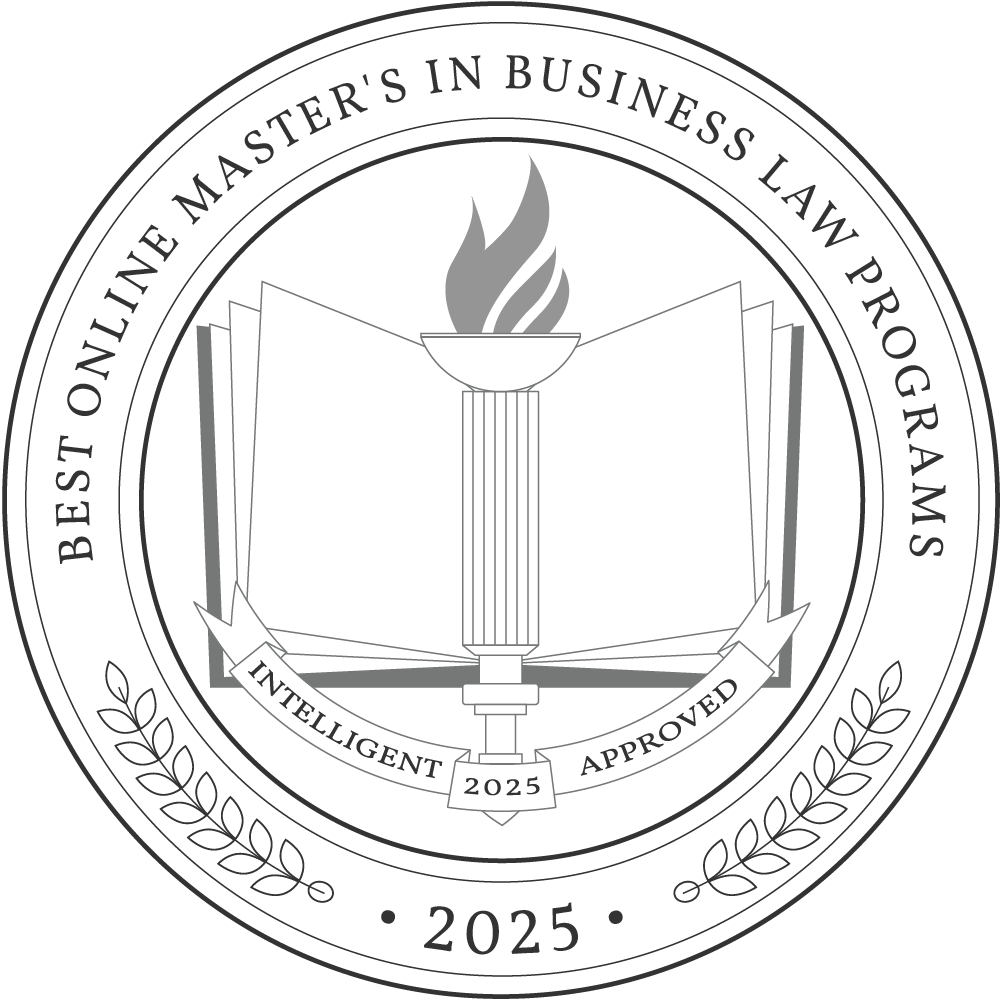A master’s degree in business law prepares you for multiple career avenues, including launching your own business or working as a corporate consultant, human resources manager, or financial analyst. This degree offers extensive knowledge of all business-related legal aspects, such as understanding tax codes, contracts, intellectual property, business ethics, and other regulatory compliance issues.
Many schools require 24 to 36 credit hours for a master’s in business law, which can be completed in one to two years of full-time study. Costs vary based on multiple factors, such as whether you attend a public or private school. The National Center for Education Statistics reports that the average tuition for a graduate degree is $12,596 at public institutions and $28,017 at private institutions.
We interviewed Blanca Villagomez, a program counselor and coordinator at UC-Irvine, who shared valuable insights and strategies for students to succeed in an online master’s degree program.
Why Trust Us
The Intelligent.com Higher Education Team is dedicated to providing students with independent, equitable school and program rankings and well-researched resources. Our expert-driven articles cover topics related to online colleges and programs, paying for school, and career outlooks. We use data from the U.S. Department of Education’s College Scorecard, the National Center for Education Statistics, and other reputable educational and professional organizations. Our academic advisory team reviews content and verifies accuracy throughout the year for the most current information. Partnerships do not influence rankings or editorial decisions.
- Analyzed over 2,000 national, accredited, and nonprofit colleges and universities
- 800+ rankings pages are reviewed and updated yearly
- Content is informed by reputable sources, surveys, and interviews with academic advisors and other experts
- Over 100 data points are reviewed for accuracy and quality throughout the year, including sources
How we rank schools
Our list features the best online Business Law degree programs at top colleges nationwide. Each school featured is a nonprofit, accredited institution — either public or private — with a high standard of academic quality for post-secondary institutions.
We evaluated each school’s program on tuition costs, admission, retention and graduation rates, faculty, reputation, and the student resources provided for online students. We collected data from trusted sources like the National Center for Education Statistics, individual school and program websites, school admissions counselors, and other data sources. Then, we calculated the Intelligent Score on a scale of 0 to 100 based on the following criterion:
Academic Quality:
- Admission rate versus enrollment rate
- Retention rate of students who return after year one
- Accreditation status (regional and programmatic)
- Nonprofit status, both private and public institutions
Graduation Rate
- Overall graduation rate
- Total number of currently enrolled students, including diversity metrics
- Student-to-faculty ratio
Cost and ROI
- In-state and out-of-state per-credit tuition rates and fees
- Required credits to graduate
- Earning potential after graduation
- Availability of federal student loans, scholarships, and other financial aid options
Student Resources
- Available student services for online-only and hybrid programs
- On-campus amenities like tutoring centers and the number of libraries
Read more about our ranking methodology.
Best 5 Accredited Online Master’s in Business Law Programs
FiltersInstitution Type
Status
- Intelligent Score
- Alphabetically By University Name
- Acceptance Rate
- Enrollment
- In-state Graduate Tuition
- Out-of-state Graduate Tuition
- In-state Undergraduate Tuition
- Out-of-state Undergraduate Tuition

University of Alabama School of Law
Intelligent Score: 99.81In-state: $10,780
Out-of-state: $30,250
In-state: $10,780
Out-of-state: $10,780
SAT: 1070-1330
ACT: 23-31
In-State: $1,003
Out-of-State: $1,898
Online
American Bar Association
24

Arizona State University
Intelligent Score: 96.40In-state: $10,710
Out-of-state: $28,800
In-state: $11,720
Out-of-state: $11,720
SAT: 1100-1320
ACT: 21-28
$565
Online
Higher Learning Commission
30

University of the Pacific
Intelligent Score: 95.38In-state: $50,370
Out-of-state: $50,370
In-state: $48,904
Out-of-state: $48,904
SAT: 1080-1340
ACT: 22-30
$1,490
Online
American Bar Association
50

Texas A&M University School of Law
Intelligent Score: 93.61In-state: $8,395
Out-of-state: $36,849
In-state: $6,775
Out-of-state: $6,775
SAT: 1160-1380
ACT: 26-32
Since 2017, Texas A&M University has offered a Master of Jurisprudence program with a certificate in business law and compliance. This is a hybrid program that combines online and on-campus courses in San Antonio. On-campus attendance is required one to three weekends a session. In the program, students learn principles of contract and commercial law, domestic and international legal perspectives on transactions, how to communicate effectively with lawyers, and more. Applicants must hold a bachelor’s degree, but there are no GPA or testing requirements. Merit scholarships are not available, but students in the program are eligible for financial aid and veteran’s benefits.
$1,127
Online
American Bar Association
30

Loyola University Chicago
Intelligent Score: 92.39In-state: $67,818
Out-of-state: $67,818
In-state: $97,480
Out-of-state: $97,480
SAT: 1190-1370
ACT: 27-32
Loyola University Chicago’s Master of Laws in Business Law program stands out in that it is designed for students who already have a Juris Doctor degree. This deep-dive program can be completed online in two years and helps attorneys develop advanced skills for advising corporate clients. Applicants must possess a bachelor’s degree and a primary law degree. Among the graduation requirements is the completion of a business law thesis paper. Further setting this program apart is students’ opportunity to represent clients through the school’s Business Law Clinic. Most faculty members are also practicing attorneys who work in private practice, for corporations, and for government entities like the U.S. Securities and Exchange Commission.
$1,615
Online
Higher Learning Commission
24
How to Choose an Online Master’s in Business Law Program
Choose your area of study
The first step in choosing an online master’s in business law program is deciding on your specific goals. Most programs offer a core group of courses, such as contracts and torts. Additional courses comprise a specialization, such as labor law, international business law, corporate compliance, or health care compliance. Depending on your career path, you’ll want to choose which school and specialty will get you where you want to go.
“If you want to pursue graduate study, ensure your exploration phase includes a skills assessment, structured research time, and networking strategies,” Villagomez suggests. “Begin by reflecting on your strengths, including areas of expertise, skills, and fields of knowledge. Gaining clarity on your strengths and interests can help you find a graduate program and career track that are a good fit.”
Remember, while a master’s degree in business law could be a good foundation for a corporate career, you’ll still need a juris doctor (JD) degree to become a corporate attorney. A master’s in business law is typically offered as either a Master of Laws (LLM) or Master of Legal Studies (MLS) degree. LLM programs are designed for students who already have a JD, while MLS programs are open to applicants who only have a bachelor’s.
Research schools and programs
You should only consider institutions that have been approved by a DOE-recognized regional accrediting organization, such as the New England Commission of Higher Education or Northwest Commission on Colleges and Universities. These organizations evaluate schools to ensure they provide students with a high-quality education. Those who attend a school that isn’t regionally accredited may be unable to access financial aid or transfer credits to another institution if needed.
Ideally, your master’s in business law program will also be accredited by a respected industry group like the Association for the Advancement of Collegiate Schools of Business (AACSB) or the Accreditation Council for Business Schools and Programs (ACBSP). These programmatic accrediting organizations have particularly high standards for business education.
Students should get as much information as possible on the programs they’re considering, including answers to the following questions:
- Who are the faculty, and what are their credentials?
- What mentorship and experiential learning opportunities does the program offer?
- What support services are available to online students?
- What networking opportunities do students have?
To learn more about any schools that you’re interested in, you can visit their website, contact an admissions counselor, follow the school on social media, or attend an in-person or virtual open house.
“You can also rely on your network during this process,” Villagomez points out. “Trusted mentors can offer valuable insights and recommendations on choosing the right graduate programs for you. You might also consider expanding your network by setting up informational interviews with alumni and current students in graduate programs you’re interested in.”
Prepare for tests and applications
Each program varies in its application requirements and process. Nevertheless, most online master’s degree programs require that a student have a bachelor’s degree from an accredited institution. In preparation for applications, it’s a good idea to collect:
- Official transcripts from any previous colleges you’ve attended
- Letter(s) of recommendation
- A resume or records of your work experience
- A personal statement or statement of purpose outlining your motivations and interest
In addition, some programs may ask students to submit standardized test scores, such as those from the GRE. If you need to take the GRE, prepare and sit for the exam while researching schools.
Before submitting an application, always contact an admissions counselor to ensure you have the most accurate information regarding requirements and deadlines.
Select your program
Some students target a single program based on their needs and interests, while others submit multiple applications to boost their chances of acceptance. Some also write out the pros and cons of each school, then list them in order of preference. That way, these students know which schools they want to apply to and which they would prefer to attend should they be accepted.
Before making your final decision, review your needs and goals again. Do you plan to attend school full-time or part-time? Are you only interested in 100% online programs, or are you fine with a hybrid program that has a few in-person requirements? Some programs offer asynchronous courses, which can be completed at your own pace, while others only offer synchronous courses, which involve remotely attending lectures and completing assignments at the same time as other students — which of these two online learning formats do you prefer?
“Despite the different modalities, all online degree programs require high self-motivation, effective time management, and structured independent study,” says Villagomez. “I recommend students create a consistent routine by identifying their optimal hours for attending classes, completing coursework, and studying to stay on track with their deadlines.”
Whatever path you choose, remember that most schools charge application fees, which can add up if you apply to several schools. If you need financial assistance with these fees, contact the different schools to request a fee waiver.
Determine how you’ll pay for your degree
When researching schools, it’s also a good idea to verify how much a program costs (including fees) and what types of financial aid are available to students. Financial assistance can include institutional aid like scholarships, grants, fellowships, and assistantships, as well as federal financial aid like loans and work-study.
If you haven’t already, now is an excellent time to complete the Free Application for Federal Student Aid (FAFSA), which determines federal student loan and need-based institutional aid eligibility.
If you’re already working, you might have another option: employer tuition assistance benefits, which can offset the cost of tuition for employees. Veterans and active duty military members may also be eligible for tuition discounts from the school.
Talk with your school’s financial aid office if you have additional questions about how to pay for your degree.
What Can You Expect from an Online Master’s in Business Law Program?
Online master’s in business law programs vary based on a school’s focus and mission, but in general, expect a core curriculum that introduces you to the legal system in the United States, from researching cases and statutes to reading, understanding, and writing legal documents. You’ll also learn about laws and regulations and how they relate to the legal system.
From there, your program likely will branch into more specialized areas of study related to business law, with some schools offering a capstone course or thesis seminar. Depending on whether you’re taking classes full- or part-time, you can complete this program within 12 to 24 months.
Potential courses you’ll take in an online master’s in business law degree program
- Overview of the U.S. Legal System: Although this program focuses on business-related issues, you’ll still need to know about the American legal system and the government’s structure and functions. This class will also cover legal concepts such as due process.
- Contract Law: Contracts, torts, and property are three building blocks of private law, which involves individuals’ rights and duties to each other. A contract law course will discuss how to form a valid and enforceable contract, problems around creating and enforcing contracts, and remedies for breach of contract.
- Torts: The law defines torts as “the field of private wrongs.” When an entity such as a corporation or an individual takes action that harms another person or their interests or property, that is a tort. A torts course examines theories of tort liability and breaks down allocating responsibility and calculating losses.
- Property Law: A property law class delves into what legally classifies as property, what rights property owners have, and how they can acquire and transfer those rights. Property can be private real estate property, personal property, and intellectual property.
- Business Principles and Ethics: Students will learn business concepts such as the sales cycle, finances, marketing, and managing employees, as well as liability issues and how businesses use legal advice. This course may also cover how politics, economics, and societal constructs affect business and how companies have shifted toward environmental and social responsibility.
What Can You Do With an Online Master’s in Business Law?
Career outlook
The career outlook for individuals with an online master’s degree in business law is promising, with numerous opportunities in both the legal and business sectors. Indeed, many of the occupations in this field are growing at a fast rate and offer particularly high salaries.
These career paths reflect the versatility of a master’s degree in business law, offering opportunities in law, business, compliance, consulting, and academia. Here are some specific job opportunities that may be available for those with an online master’s degree in business law:
- Arbitrator, mediator, or conciliator — Help opposing parties settle disputes by facilitating communication between parties, interviewing claimants and witnesses, and preparing settlement agreements.
- Median annual salary: $64,030
- Projected employment growth (through 2032): 5%
- New job openings projected: 400 annually
- Human resources manager — Oversee the administrative functions of an organization, which often involves ensuring regulatory compliance and settling disputes.
- Median annual salary: $130,000
- Projected employment growth (through 2032): 5%
- New job openings projected: 15,500 annually
- Management analyst — Provide expert advice in order to help organizations solve problems and improve efficiency.
- Median annual salary: $95,290
- Projected employment growth (through 2032): 10%
- New job openings projected: 92,900 annually
Online Master’s Degree in Business Law Frequently Asked Questions
How do I apply to an online master’s in business law degree program?
Preparation is critical for applying to an online business law degree program. Confirm the application processes at all the schools you’re applying to, and gather the relevant required information, including letters of recommendation, undergraduate college transcripts, your resume, and GRE test scores.
Most schools accept applications and supporting materials electronically through their websites. Prospective students can also create an account through the non-profit Law School Admission Council to apply to several law schools nationwide.
How much does an online master’s in business law degree cost?
The cost will depend on various factors, including the type of institution you attend (public versus private), the length of the program, additional fees assessed by the school, and technology needs. On average, tuition for graduate programs is $12,596 at public universities and $28,017 at private schools.
How long does it take to earn an online master’s in business law degree?
Most schools estimate their online master’s programs in business law take about one to two years to complete for a full-time student. However, some schools offer intense accelerated programs where students can complete their required courses in a compressed time frame. On the other hand, if you are studying part-time, it will take longer to earn your master’s degree.
Is an online master’s in business law worth it?
Ultimately, the value of an online master’s in business law depends on your circumstances, goals, and commitment to the field. It can be a valuable investment if it aligns with your career objectives and offers opportunities for advancement and specialization. If your career aspirations involve working in legal or compliance roles within the business sector, such as corporate counsel, compliance officer, or contracts manager, a master’s in business law can provide valuable knowledge and skills.
An advanced degree can set you apart from competitors in the job market. It demonstrates a commitment to continuous learning and expertise in business law. It may also open the doors to leadership positions and more lucrative salaries and benefits.
Earning your degree online can be an excellent choice for adult learners who have other professional and personal commitments. Also, it demonstrates to employers that the degree holder has superior time management skills and the ability to work well both alone and with others.


